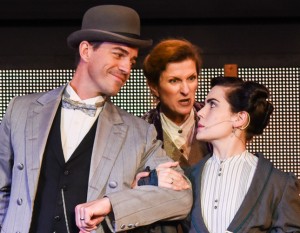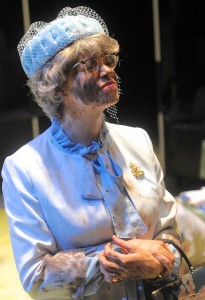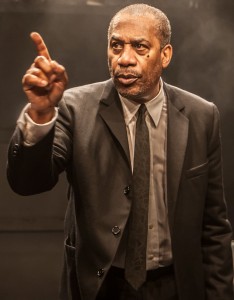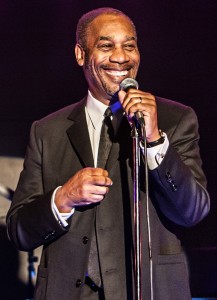Blind Runner, written and directed by Amir Reza Koohestani, features only two actors. Set in Iran, the play is about a husband (Mohammed Reza Hosseinzadeh) and wife (Ainaz Azarhoush) who now only meet during prison visiting hours. Neither has an actual name. Wife is serving a sentence for something she posted on social media. Although it’s not specific, there is a suggestion she showed support for women who protested the 2022 killing of Mahsa Amini by the Guidance Patrol, a type of morality police. The post alters the lives of the couple.
Kafkaesque!
Kafkaesque!, a clever new musical comedy with book, music, and lyrics by James Harvey, draws together the life of Czech novelist Franz Kafka and his major (and one minor) works. The show opens with Kafka (Harvey, a talented composer and pianist) at the piano as he defines who he is: a writer whose work has had so much impact that he’s become an adjective. The opening song about “the evils of bureaucracy, modernity’s alienation, man’s talent for hypocrisy, neuroses and fixation!” showcases the main themes of Kafka’s work that are woven together in the musical.
Empire
Empire, a musical about the building of the Empire State Building—has a lot of heart. Set in three time periods—1929, 1930, and 1976—the story moves back and forth between Sylvie Lee (Julia Louise Hosack) and Mohawk Grandmother (April Ortiz) in the 1970s and the character of Frances Belle (Kaitlyn Davidson), a.k.a. “Wally,” a firecracker of a woman who is classy in pants, working her magic in a man’s world in the 1920s and ’30s, as the iconic skyscraper is being built.
Foxes
Foxes, set in a Black Caribbean community in London, is a sly and thoughtful exploration of a series of taboo subjects. Meera (Nemide May), who is from a Muslim family, tells her boyfriend Daniel (Raphel Famotibe), who is from a Caribbean Christian family, that she is pregnant. That creates a big problem: how will these two young people, from different cultural and religious backgrounds, work it out? They are also at the beginning of their young adult life, trying to determine their future. Daniel is planning on going to university, or “uni” as the Brits call it.
Sex, Grift and Death
Potomac Theatre Project’s Sex, Grift and Death, an evening of one-acts by British playwrights Steven Berkoff and Caryl Churchill, captures the brutal nature of sex, financial survival, death, and illness. The lively cast uses a mixture of British and American accents that work for the sensibility of each piece.
Heartland
Hope blooms even in the darkest and cruelest of times in Heartland, by Gabriel Jason Dean. The story pairs two unlikely geographical places: Omaha, Nebraska, and Afghanistan. Geetee (Mari Vial-Golden), is an Afghani orphan who was displaced by war and adopted by Harold (Mark Cuddy), an Afghani scholar who teaches at the University of Nebraska. She returns to her homeland as an adult to teach at Blue Sky, a school for girls. There she meets Nazrullah (Naz, for short), a math teacher at the school.
One Discordant Violin
In One Discordant Violin, the music and narration are central to the story, sometimes complimenting each other and at other times riffing on one another. Adapted by Yann Martel (Life of Pi) from his own short story, the play follows the adventure of a single narrator whose journey provokes a meditation on the meaning of life, the Vietnam War, Trump, the real estate mogul, Joseph Conrad’s stories and fastidious use of punctuation, and the lost dreams of youth.
Runboyrun and In Old Age
Runboyrun and In Old Age, by Mfoniso Udofia, a master at wordplay, capture the power of letting go of the past. The two plays are part of Udofia’s nine-part cycle that focuses on several generations of Nigerian immigrants who have settled in America. In Runboyrun and In Old Age, a catharsis occurs when the truth is revealed, and characters meet this new feeling with both hope and sadness.
Original Sound
Original Sound, deftly written by Adam Seidel, explores the idea of what it means to be an original music artist in the age of the Internet, which has made it easy to borrow pieces of others’ work (“sample”) and use in your own. At the center of the story are Danny Solis (the sublime yet down-to-earth Sebastian Chacon), a Nuyorican mix artist who is having a hard time getting by in life because all he wants to do is make music, and Ryan Reed (Jane Bruce, a talented singer/songwriter in her own right) who is an upcoming star with a recording contract.
We Are the Tigers
We Are the Tigers, which punningly describes itself as “a killer new musical,” is a whodunit that explores the trajectory of a group of teenage girls who couldn’t be more different. The girls are part of a cheerleading team called the Tigers, but are dogged by an epic stumble in the last game which went viral and left them the laughingstock of their high school community. This year, they’re determined to make a comeback. In the course of an evening, two cheerleaders are bumped off and another set up, but can the motive really be just to restore their reputation?
Endangered
Endangered: The Musical, by Keni Fine and Tony Small, is like The Wizard of Oz meets Hairspray. It’s about a young boy’s journey, and it has a social message. The story centers on Levi Lovewell (Theo Errig), a young, aspiring journalist whose parents shelter him. But, during a trip to the zoo, his curiosity gets the better of him and he breaks away from them.
The Seagull
The Instigators’ adaptation of Anton Chekhov’s The Seagull, directed by Lillian Meredith, uses immersive elements to enhance and punctuate both large and small moments. Actors break the fourth wall, and the staging brings actors in line with the audience.
The Government Inspector
A classic case of mistaken identity sets a hilarious ball in motion in The Government Inspector, Nikolai Gogol’s 1836 comedy, set in a small town, a backwater of “mud and more mud.” The plot follows the mayor (the robust Michael McGrath) who has heard that a government inspector is coming to town—incognito. The mayor and his crooked cronies—the school principal (David Manis), the judge (Tom Alan Robbins) and the hospital director (Stephen DeRosa)—immediately try to clean up the mess they have made of government buildings and services.
Liberty for All
Liberty: A Monumental New Musical captures an America not unlike the one we see today: a place where people want to come, but also where many struggle to find work and build a simple but stable life. The story begins when Frédéric-Auguste Bartholdi, a French artist, lovingly completes his statue and sends her to the United States (it's a gift from France to commemorate a century of independence), as if she were his own child. Liberty (played by teenage actress Abigail Shapiro) comes looking for a pedestal on which she can stand to spread her message of hope and freedom.
However, when she arrives at Ellis Island, she is given the same treatment as every other immigrant. She is poked and prodded, and given the twice-over; only to be rejected—after all, what is her purpose here anyway? Hope? That’s not enough. Commissioner Francis A. Walker, who was responsible for the census in the mid-1800s (played with a debonair charm by Brandon Andrus), schedules her to return to France on the next boat. Liberty perseveres. After all, hope is not only for the immigrant, but for everyone seeking freedom and a better life.
The wonderful cast brings life to a variety of characters: an Italian immigrant (Nick Devito), an Irish foreman (Mark Aldrich, who also plays news mogul Joseph Pulitzer), a Russian knish seller (Tina Stafford, who moves gracefully between the Russian Olga, and a wealthy American heiress named Regina Schuyler), a former slave (C. Mingo Lingo), and a native American Indian (Ryan Duncan).
Liberty is a love song to New York—a city that embraces everyone, or at least tries to—but it’s also a history lesson. There’s a great deal of information about Emma Lazarus, played with tight-lipped determination by Emma Rosenthal, who is the most well-drawn character in the play, and the most interesting. She teaches English to Giovanni, an Italian immigrant who seems to hang around the port (is he being deported, or just a loafer?). His improved English increases his betting options: “Ten to one!” he says triumphantly and skitters off. Emma looks after him with a wry smile, clearly amused. This intrigue, however, is forbidden: Emma is from an affluent Jewish family that has been in America for four generations. Hanging around the port and new immigrants is not what a society girl is supposed to do, even if she is a poet, and Regina Schuyler, a wealthy woman who puts her money where it will give her the highest profile, makes sure Emma knows she’s being watched.
With book and lyrics by Dana Leslie Goldstein, there are some laughs along the way. Particularly funny are “The Charity Tango” sung by Liberty, Commissioner Walker and Schuyler, and “We Had It Worse” in which the Russian immigrant Olga and the Irish immigrant Patrick McKay compete to see who had it worse when they first arrived in America. However, as they crescendo in their comparisons, they also discover they agree on something when they sing: “Kids have no idea what hard work is” (…) “Soft” (…) “like a boiled cabbage,” and do a double-take in each other’s direction; they finish the song with a broad smile.
The production is fun, and kid-friendly, but very uneven. While the libretto is outstanding, the music by Jon Goldstein sounds canned; all the tracks seem to have been created on a synthesizer. The stage also feels small, not only because it is small, but because Evan Pappas's staging lacks dynamics and, at times, deflates the production. Some choreographed movement would have given the actors some breadth and depth and the production real musical-theater flair. Nonetheless, the cast clearly has their musical theater chops, and is led to a hopeful finale by Lady Liberty, who proves that perseverance pays off—a message we know is often true.
Liberty: A Monumental New Musical plays an open run at 42 West, 514 West 42nd St., between 10th and 11th avenues. Performances are Sundays at 2 and 5 p.m.; Mondays and Wednesdays at 3 and 7 p.m.; and Thursdays at noon and 3 p.m. Tickets are $72/$36 (premium/child premium); $63 (adult); $27 (children 4-12) and may be purchased by visiting LibertyTheMusical.com.
Truths Be Told
The British have a way of turning the everyday inside out in a humorous way. Confusions, written and directed by Alan Ayckbourn, and part of the Brits Off Broadway festival, is a masterly series of vignettes in which characters try hard to maintain normalcy and decorum, but when a single truth is revealed through an ill-timed but dramatically funny mishap, a more personal and meaningful internal world is uncovered. The cast of five—Elizabeth Hoag, Charlotte Harwood, Stephen Billington, Richard Stacey and Russell Dixon—skillfully play a handful of characters.
In “Mother Figure,” Lucy (Elizabeth Hoag) is a harried and all-consumed mother who doesn’t pay much attention to the ring of the phone, the doorbell, and thus the outside world. When her neighbors, Terry (Stephen Billington) and Rosemary (Charlotte Harwood), stop by to check on her for her husband who is away, she can’t seem to carry on a simple conversation. Instead, she offers juice to Rosemary and milk to Terry, to which he defiantly claims he “hates the damned stuff.” She counters: “I’m not going to waste my breath arguing with you, Terry. It’s entirely up to you if you don’t want to be big and strong.” Terry doesn’t have a clue how to respond. When Terry drinks all of Rosemary’s juice and then insults her, the moment uncovers some bigger marital problems. Lucy, undaunted, doesn’t believe anything can’t be solved with simple directives, and orders Terry to say he’s sorry to Rosemary. Reduced by her stern mother figure, they kiss her good-night before they leave, and when she tells them to hold hands while crossing the street, they oblige, and one feels all has been restored.
“Drinking Companion” shows Lucy’s husband, Harry (Richard Stacey), a traveling salesman who feels his wife is happier when he’s away. Desperate to connect with another adult, particularly a woman, he makes a show of being friendly with Paula (Charlotte Harwood) at the hotel bar. He struggles to pump himself up when he talks about his line of haute couture and colors, but all he really wants is companionship. As he grows drunker he tries not to make advances, but puts his key on the table, and says, “I’m going to leave it there. I’m not going to try and embarrass you, you see, but its there. If you want to pick it up, it’s there. Entirely up to you.” When he goes out to call a cab, Paula and her friend slip away. Poor Harry.
Ayckbourn also captures how communication is about energy and not necessarily words. In “Between Mouthfuls” two separate couples dine at a restaurant under the pretense of having a pleasant evening out. However, their conversations soon turn to jealousies. As things intensify, they continue their argument even when the sounds of their voices drop away. Their jaws, working out the tension around the words, still speak volumes.
Sometimes a small reveal can have big consequences. This is especially true in “Gosforth’s Fete” in which Milly (Charlotte Harwood) is setting up for tea in a tent to celebrate the visit of an important patron. There are many problems that day, including a mute loudspeaker. Gosforth, the organizer of the event and local pub owner, tinkers with the loudspeaker during a conversation with Milly. Unbeknownst to them, he gets it to work at the same time that Milly reveals her news. It’s a cringeworthy yet funny moment because it’s the kind of timing you know can happen but wish it wouldn’t. Milly’s fiancé Martin (Stephen Billington), a Boy Scout leader, is so overwrought from the inadvertent revelation he gets drunk on sherry. In the end, Milly sizes him up and declares that she doesn’t like his baggy shorts anymore, anyway.
Capping the evening, “A Talk in the Park” brings the ensemble together. Each character wants to enjoy the park alone for various, personal reasons. With only four park benches and five characters, one is bound to join another. In a round robin of sorts, one sits next to another, thus intruding on their solitude. However, as much as these people want to be left alone, they don’t hesitate to complain about the person who was “talking too much” to the occupant on the next bench when they move. It turns out they can’t help talking too much as well, and thus the initial occupant moves to the next bench. And so the circle continues. The scene captures both the inside and outside aspect of our desires to be alone, yet at the same time to share and unburden the troubles we carry in our hearts and minds.
Confusions by Alan Ayckbourn is part of the Brits Off Broadway festival and is playing through July 3 in repertory with Hero's Welcome at 59E59 Theaters (59 East 59th St. in Manhattan). Tickets are $70 and may be purchased by calling Ticket Central at (212) 279-4200 or visiting www.59e59.org, where the repertory schedule may also be seen.
The Tongue Is a Mighty Sword
Move over, James Brown. It’s time to add Joe Morton and Dick Gregory's names to the pantheon of hardest-working men in show business. In Turn Me Loose, written by Gretchen Law and directed by John Gould Rubin, Morton gives a tour de force performance as Gregory, the tireless civil rights activist and stand up comic known for his acerbic social satire on race and American politics.
Morton, of the hit TV show Scandal, adeptly captures both the younger and the older Gregory as the play moves back and forth in time. As a comedian, Gregory eloquently holds a mirror up to the contradictions in American society. Although he believes economics are at the root of many problems in society, he contends that “poverty is not the worst disease on earth. Racism is.”
Born in 1932, in St. Louis, Gregory says he had “black assets: fast feet, and a fast tongue.” He was athletic and outspoken, and when he was given a three-year contract at Hugh Hefner’s Playboy Club in Chicago in 1961, he was catapulted into another realm as an entertainer, not as a “shuffling minstrel, but as a 28-year-old star.” However, he often stepped down from comedy to take up the cause of the 1960s civil rights movement and march side by side with Medgar Evers.
Morton captures the conflict between being a performer and being an activist that caused Gregory to take pause at moments in his life. In a chilling moment, the young activist gets a bad feeling that he can’t shake before heading back down South to join Evers. But suddenly his son dies and he returns North to join his wife. Only two weeks later, Evers is assassinated; Gregory believes his personal tragedy spared his life. The dangers of activism and being a black man in the South in the ’60s were never more apparent. He realizes that the "racist system is nothing but a shadow. You got to dive through—every day could be your last.” He also realizes that bigotry is like the barb of an arrow piercing the skin. Gregory returns to comedy and aims, not so much to extract the arrowhead from the sides of American racists, but to shake them with enough laughter that it will fall out.
Morton’s voice has a deep timbre, and he has amazing reserve and control over both his voice and physicality. Often, while the tempo and volume rise, his body is restrained and still. Near the finale, sweat pours down his face, and instead of taking the handkerchief, as he does at times throughout the play, he forges through what he has to say: the power of his words is amplified by the apoplectic state of his face.
The raw immediacy of Morton’s performance, coupled with the power of Gregory’s message, incites some members of the audience to murmur “Mmm-hmmm” and “Yeah,” as if they are receiving a message from the pulpit rather than the stage. Also helping tell the story in a variety of roles is John Carlin; among other things he plays a bumbling mediator at a loss for words when Gregory delivers an acerbic diagnosis of the state of economics and its effect on all that ails American society.
It takes tremendous courage and intelligence to design and deliver the kind of comedy Gregory does. At 83, he's still going strong. Because of his work with the civil rights movement, and the way in which he has relentlessly, with humor, grace and a tongue like a sword, dissected the contradictions about race in America, the conversation itself has since taken a few twists and turns. For instance, Vin Diesel, who rose to stardom in The Fast and Furious films, declines to accept any racial pigeonhole. Rather, says one observer, Diesel presents himself as “a multiethnic Everyman.” The actor’s insistence on identifying himself as a human being, rather than by race, is an important step. As Turn Me Loose makes plain, it’s one that Dick Gregory has worked tirelessly for.
Turn Me Loose plays at the Westside Theatre (407 West 43rd St.) through July 3. Evening performances are at 7 p.m. Tuesday, at 7:30 p.m. Wednesday and Thursday, and at 8 p.m. Friday and Saturday; matinees are at 2 p.m. Saturday and at 3 p.m. Sunday. Tickets are $79 and may be purchased by calling (212) 239-6200 or visiting www.turnmelooseplay.com.

























